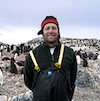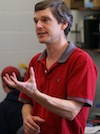
Robohub.org
050
50 years of robotics (Part 1) with Rolf Pfeifer, Mark Tilden, Hiroshi Ishiguro, Oscar Schofield and Steve Potter
Today we celebrate the 50th episode of ROBOTS!
For the occasion we speak with 12 scientists about the most remarkable developments in robotics over the last 50 years and their prediction for the next half-century. This 50th special is split into two episodes with the second half airing in two weeks.
Today we’ll be talking to Rolf Pfeifer on robotics in general, Mark Tilden robot toys, Hiroshi Ishiguro on androids, Oscar Schofield on underwater robots, Steve Potter on brain machine interfaces and Chris Rogers on eduction robots. Our next episode will give you a snapshot view on nano robots, AI, flying robots, human robot interactions, robot business, and space robots.
We’ve also upgraded our website so that you can easily browse through episodes by topic, interviewee, tag or just listen to one of our favorites, so have a look!
You can interact with the ROBOTS community by leaving comments directly under episode posts or on our new sleek forum. To do both, just log-in once in the top bar of the website.
Rolf Pfeifer

Rolf Pfeifer is Professor at the University of Zurich where he directs the Artificial Intelligence Laboratory. He pioneered a new approach to artificial intelligence (“New AI”), which emphasizes the role of embodiment and argues that thought is not independent of the body, but tightly constrained, and at the same time enabled by it.
Mark Tilden
 Mark Tilden is a famous robot inventor who builds new robots on a daily basis. He pioneered a philosophy for making simple and reactive robots and tagged it BEAM robotics (which stands for Biology, Electronics, Aesthetics, and Mechanics). Lately, Tilden has been making famous products such as the Robosapien and Femisapien robots at WowWee.
Mark Tilden is a famous robot inventor who builds new robots on a daily basis. He pioneered a philosophy for making simple and reactive robots and tagged it BEAM robotics (which stands for Biology, Electronics, Aesthetics, and Mechanics). Lately, Tilden has been making famous products such as the Robosapien and Femisapien robots at WowWee.
Hiroshi Ishiguro
 Hiroshi Ishiguro is professor at Osaka University in Japan where he directs the Intelligent Robotics Laboratory. Ishiguro is most know for his near-real Androids which closely resemble human models, including himself, his daughter and a famous news anchor. Geminoid F, his latest model, was recently featured in the blogosphere.
Hiroshi Ishiguro is professor at Osaka University in Japan where he directs the Intelligent Robotics Laboratory. Ishiguro is most know for his near-real Androids which closely resemble human models, including himself, his daughter and a famous news anchor. Geminoid F, his latest model, was recently featured in the blogosphere.
Oscar Schofield
 Oscar Schofield is Professor of Bio-Optical Oceanography at the Rutgers Coastal Ocean Observation Lab or COOL lab at Rutgers University.
Oscar Schofield is Professor of Bio-Optical Oceanography at the Rutgers Coastal Ocean Observation Lab or COOL lab at Rutgers University.
Schofield is an expert in underwater robots, taking part in recent projects such as the Scarlet Knight glider which crossed the Atlantic Ocean fully autonomously while dodging fishing nets, strong currents and even the occasional shark.
Steve Potter
 Steve Potter is the Director of the Potter Group which is part of the Laboratory for NeuroEngineering, a collective research unit shared between Emory University and the Georgia Institute of Technology.
Steve Potter is the Director of the Potter Group which is part of the Laboratory for NeuroEngineering, a collective research unit shared between Emory University and the Georgia Institute of Technology.
Having interfaced robots to in-vitro neurons, Potter talks about the field of brain-machine interfaces and its potential impact in medicine and neuroscience
Chris Rogers
 Chris Rogers is a professor of mechanical engineering at Tufts University in the US.
Chris Rogers is a professor of mechanical engineering at Tufts University in the US.
As director of the Center for Engineering Education Outreach, Rogers tours the elementary schools of the world trying to bring engineering and robotics to young children. He has also worked with LEGO to develop ROBOLAB, a robotic approach to learning science and math.
Links:
- Download mp3 (23.6 MB)
- Subscribe to Robots using iTunes
- Subscribe to Robots using RSS
- Rolf Pfeifer’s Webpage
- Mark Tilden’s Webpage
- Hiroshi Ishiguro’s Webpage
- Oscar Schofield’s Webpage
- Steve Potter’s Webpage
- Chris Rogers’s Webpage
Latest News:
For more information on this episode’s news, including videos of the PR2 robot folding towels and Honda’s U3-X robot and links to the MIT Personal Robotics group’s Mars Escape game, have a look at the Robots Forum.
tags: entertainment, human-robot interaction, Mark Tilden, podcast





